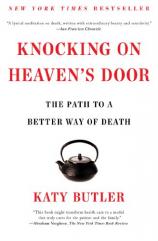Knocking on Heaven's Door: The Path to a Better Way of Death
Review
Knocking on Heaven's Door: The Path to a Better Way of Death
In present-day American culture, death is very much a taboo subject. It makes people uncomfortable to talk about, think about, or deal with. Gone are the days of an elderly person dying quietly at home surrounded by loved ones. In its place are high-tech medical intervention and heroic measures performed by absolute strangers while worried family members are left to pace the waiting room. Often, the downward spiral toward death begins with a 911 call, an ambulance ride to the nearest emergency room, and admission to the hospital. Many consumers of healthcare really know little about it until a medical crisis occurs, and that is a very stressful time to be making important decisions.
"KNOCKING ON HEAVEN’S DOOR is part memoir, part medical history, and part current research. It is a timely and important book that I believe will have a significant impact on its readers."
Author Katy Butler, an investigative reporter living in California, spent years shuttling to and from her parents' home in Connecticut after her elderly father, Jeff, had a debilitating stroke. Her mother, Valerie, was the caregiver yet was physically and emotionally drained by the demands of caring for her husband around the clock. It seemed that no matter what symptoms presented, modern medicine in the form of specialists with procedures and/or medical equipment had the answer to the problem: more medical intervention. Katy and her mother weren't informed that the pacemaker the doctor wanted to insert to improve Jeff's slow heartbeat prior to a necessary hernia surgery would last 10 years. Certainly, they had no idea that the "bonus" years would be of such poor quality, health-wise.
In the fall of 2007, Valerie asked Katy to help her get Jeff's pacemaker turned off, a very drastic request made after much mental anguish. That caused its own set of thorny legal and ethical problems. The doctors refused. The patient had no ability to speak for himself. Valerie and Katy knew what Jeff wanted and tried time and again, to no avail, to advocate for him. Jeff finally succumbed to pneumonia, once referred to "as the old man’s friend."
The author discusses the legal, ethical and moral ramifications of such procedures as deactivating a pacemaker. A good part of the book explains the history of the advent of modern-day medicine --- pacemakers, defibrillators, intensive care units, ventilators, and the rest. Huge strides have been made in the last few decades in medical treatment. The improvements, though, have not come without a price. How much treatment is too much? Can a patient say "Enough. Let me be"? What is required to legally enforce such requests?
All Katy ever wanted was a peaceful death for her parents when their time came. She had no idea just how difficult that can be to accomplish. Modern medicine works to save, extend and prolong life. Has the pendulum swung too far in that direction? If so, who gets to decide when to halt treatment? How do advance directives and "do not resuscitate" orders really work when the time comes to apply the patient's final wishes?
This really is not a dreary book about so-called "death panels" or euthanasia. Rather, it is a frank look at how the current practice of medicine actually works. This thought-provoking work will have the reader realizing that the time to have that difficult talk with family members and decide about advance directives, living wills, and all other end-of-life issues is now, not later on. Often, later on is too late.
KNOCKING ON HEAVEN’S DOOR is part memoir, part medical history, and part current research. It is a timely and important book that I believe will have a significant impact on its readers.
Reviewed by Carole Turner on September 13, 2013
Knocking on Heaven's Door: The Path to a Better Way of Death
- Publication Date: June 10, 2014
- Genres: Health, Medicine, Nonfiction
- Paperback: 352 pages
- Publisher: Scribner
- ISBN-10: 1451641982
- ISBN-13: 9781451641981





